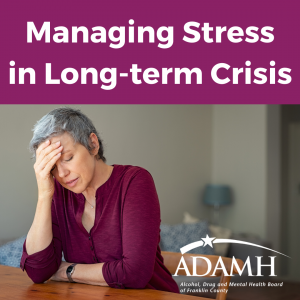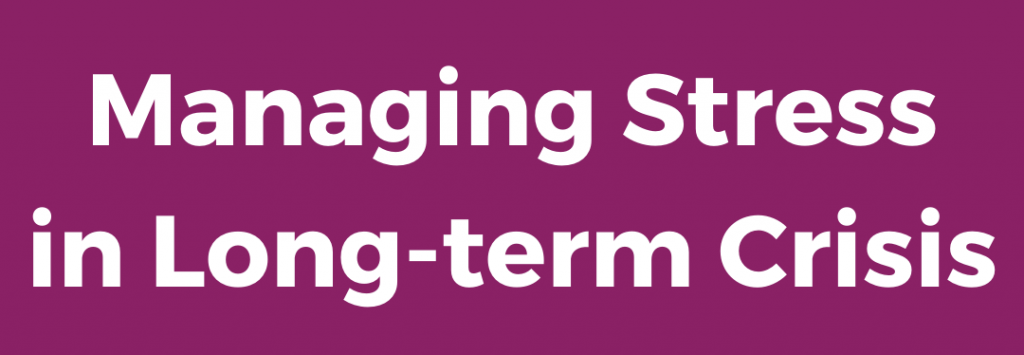Managing Stress in Long-term Crisis

By ADAMH Medical Director, Dr. Delaney Smith
This is a time of great uncertainty and times of uncertainty can produce anxiety. Focusing on your mental health is an important way to prepare yourself to address the COVID-19 pandemic both personally and as a community.
The gradual and looming nature of this pandemic is different than the usual disaster that we have faced in the past. Natural disasters strike, often with little warning, and then they are over. COVID-19 is unlike a natural disaster with a defined start and end. The anticipation of this illness and knowledge that our daily lives will continue to be impacted for an unclear length of time can make that anxiety worse. Our bodies are designed to deal with crises through our sympathetic nervous system that releases hormones to prepare us to take on the challenge. This is often referred to as the fight or flight response. But when a stress is not short-lived, our bodies continue to produce these so-called stress hormones and they go from being helpful to being harmful. One of these hormones, cortisol, is associated with many negative health impacts, including lowered immune response, which is why we need to take care of our mental health.
If you or someone you care about is feeling increased anxiety due to COVID-19 there are things you can do that will help:
- Acknowledge that it’s normal to feel anxiety in these situations. Anxiety is our body’s way to signal us to prepare, but it’s up to us to direct that energy into healthy coping strategies.
- Control what you can. Take care of yourself by resting, eating healthy and washing hands.
- Use trusted sources for information like the Center for Disease Control, Ohio Department of Health and your local health departments so you feel informed and empowered.
- Limit media exposure. Take frequent breaks, particularly from social media, where contradictory and often erroneous information can worsen stress.
- Maintain a routine with normal wake and sleep times and designated times for other healthy activities.
- If you are working from home, take steps to protect family time. Try to set up one space for work so the rest of your home is a work-free, low stress zone. Don’t work in your bedroom which can impact sleep!
- Limit substance use. Drugs and alcohol will leave you feeling more anxious and depressed in the long run and can lead to medical problems that may make you more susceptible to infections.
- Get outside, if possible, for walks and physical activity. If going out is not possible, maximize fresh air and natural sun light by opening a window.
- Incorporate Exercise into your day routine. Walk, meditate, stretch, practice deep breathing, or find a free video or exercise app. If you’re missing your usual exercise classes, try connecting with some of your usual workout buddies over a video chat like Zoom or Facetime!
- Recognize signs of stress and anxiety in
yourself and others:
- Worry
- Fear
- Insomnia
- Poor concentration
- Irritability
- Avoiding certain situations
- Increased substance use
- Change in energy
- Crying
- Inability to enjoy things
*These are all warning signs that you need to take a step back and focus on your mental health. Reach out to a trusted friend and utilize mental health warmlines/hotlines and other available resources when you need help. Follow the link below for resources that you can use and share.

